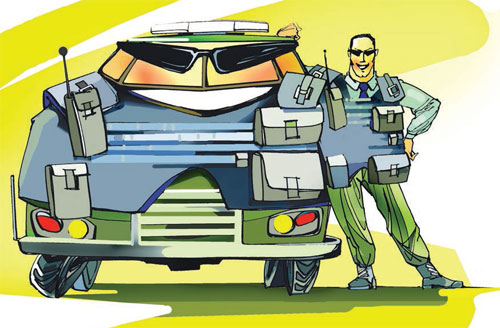To any ordinary visitor witnessing cash collection at the bank, it looks rather like filming of an American blockbuster film at a secret military base. All is quiet, with athletic men in bulletproof vests greeting with a salute.
Man’s job
Only those who’ve served in the armed forces are employed, explains Sergey Iodo, who heads the Cash Collection Department at Belarusbank JSC branch #519. He notes that there is no upper limit, but only those aged over 21 are eligible. The youngest is 22 and oldest 62 — among 150 collectors. No women are employed although, theoretically, no gender restrictions exist. However, cash collectors need to be able to lift and carry heavy bags, weighing up to several dozen kilogrammes. Moreover, one hand should be always free, as emergency situations do arise.
No special courses are available to train cash collectors; rather, experienced collectors mentor newcomers. Chief cash collector Sergey Kikun, tells us, “Pupils don’t step away from their teachers, even by a single metre, including when they are en route. Moreover, the teacher constantly describes what he’s doing and why, so his mentee can understand and emulate.” Sergey is in his fourth year of the job, so has already begun tutoring. It takes a month, after which the newcomer is examined.
He explains, “I spent three days showing my pupil everything, before allowing him to try for himself. I was always nearby, in order to offer suggestions.” He admits feeling anxious during his pupil’s examination, for which he was allowed to be present. He adds, “Examiners can ask not only questions from the programme but can describe any potential situation, asking the candidate to think logically to find a solution to an unexpected emergency.”

Following instructions
“The working day starts at 7am,” continues Mr. Kikun. “After instructions and receipt of arms, we’re given cash and set off. Sometimes, we bring cash to banks while, at other times, we collect it. We return to the office for meals and our working day finishes about 10pm.” Cash collectors never see the contents of their bags, which may contain money, gold, valuables or precious documents. “When collecting, we show our arrival card, and only the cashier writes down the sum in the bag,” Mr. Iodo reveals.
Cash collectors are always in plain sight and their route monitored via satellite. It’s forbidden to use a mobile but there is a telephone for the brigade’s use: purely for official communication and containing the telephone numbers of the head of the department, the deputy, the director, the operator on duty and other officials. Each brigade member also has a portable radio device: the chief collector, driver and cash collector.
Armed
“We rarely have need to use our weapons,” stresses Mr. Iodo. “The cash collector is forbidden to wield a weapon against a pregnant woman, children or those who are handicapped — unless they are directly approached. It’s forbidden to use pistols or sub-machine guns in public places and, before using their weapon, the cash collector should take every measure to avoid doing so.”
Fortunately, it’s rare for someone to attack a cash collector in Belarus. Pavel Tarasevich has never had to use his weapon, in over fifteen years of work. “We live in a quiet country, which pleases me,” he says. “This isn’t Moscow, where attacks on cash collectors happen almost every week.” Nevertheless, incidents do occur. “Several years ago, there was an attack on a cash collector working for another bank in Grodno,” recollects Mr. Iodo. “The robbers managed to steal the money.” Probably, the most well-known such incident happened almost twenty years ago. In the Logoisk District, a cash collector shot his two colleagues and stole a sum equivalent to $2m. Having failed to escape the police, he shot himself dead with his duty gun.
Everyone has seen the armoured cash-in-transit vehicle at least once: it’s like a safe on wheels, with doors locked automatically on the entrance and exit of cash collectors. A small window — a gun-slot — is designed for firing.
People sometimes complain about cash-in-transit vehicles being parked on the pavement, explains Mr. Iodo. “People often send photos and we have to explain that it’s a security measure and that our vehicles are permitted to do so by law,” he notes. Others report the vehicles driving faster than ambulances but Mr. Iodo emphasises that they always keep within the speed limit. However, they need to visit up to 80 locations within six hours, so they need to drive faster than the average Minsk speed of 25km/h.
Mr. Iodo adds that the development of non-cash payments abroad does affect the need for cash collectors, but admits that Belarus is some way off from this point and, however small the amount of cash, security measures will always be employed. Moreover, gold, diamonds, lottery tickets, bonds and valuable documents also need to be transported, so the service will continue to be needed for many years yet.











